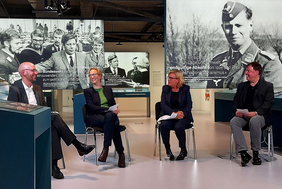Watch online: Armed Forces for Peace: The Past, Present and Future of Innere Führung

The concept of Innere Führung (officially translated as “leadership development and civic education”) is the foundation of the Bundeswehr’s value system as well as its self-image. It conceives of Bundeswehr soldiers as “citizens in uniform” who are especially committed to the norms and values set forth in the German Grundgesetz, or Basic Law. What meaning does this leitmotif, as conceptualised by Wolf Graf von Baudissin, hold for the Bundeswehr today? How can military operations abroad, far-right extremism, and the use of autonomous weapons be reconciled with the basic principles of Innere Führung, and what adjustments are necessary? These were the questions addressed during an event co-hosted by the Federal Chancellor Helmut Schmidt Foundation (BKHS) and the Institute for Peace Research and Security Policy at the University of Hamburg (IFSH). The event was streamed live from the new Schmidt! Living Democracy exhibit in Hamburg. The guest speaker of the evening was Dr Eva Högl, Parliamentary Commissioner for the Armed Forces.
Tracing the biographical and historical background
Professor Dr Dagmar Bussiek, a historian and biographer of Baudissin, and Dr Magnus Koch, head of exhibitions and history at the BKHS, first took a look at the historical roots of the leitmotif Innere Führung. They also showed which biographical influences made Wolf Graf von Baudissin and Helmut Schmidt into advocates for an armed forces shaped by democratic principles.
Von Baudissin and Schmidt: Two crucial trailblazers
Wolf Graf von Baudissin, founding director of the IFSH, established the concept of Innere Führung in the 1950s as a way to fundamentally differentiate the post-war Bundeswehr from the Nazi Wehrmacht. Helmut Schmidt was deeply involved in implementing the concept long before his time as Minister of Defence; he was considered a vehement advocate for a Bundeswehr that is firmly anchored in society.
In a talk moderated by Dr Meik Woyke, chairman of the management board and managing director of the BKHS, and IFSH director Professor Dr Ursula Schröder, participants Dr Eva Högl, Dr Hendrik Hegemann (senior researcher for Societal Peace and Internal Security at the IFSH) and Professor Dr Stefan Bayer (deputy director of the German Institute for Defence and Strategic Studies, GIDS) discussed current challenges in day-to-day military life and the compatibility of these challenges with the leitmotif of Innere Führung.
“Red lines must not be crossed” – Dr Eva Högl
The concept of Innere Führung is not just something that is “nice to have”, but rather something that remains an essential prerequisite for Bundeswehr missions, Dr Högl said. Recently, incidents of far-right extremism in the armed forces – including in the elite Special Forces Command (KSK) – have again and again made headlines. These incidents show that we need to take action, Dr Högl, the Commissioner for the Armed Forces, said. She stated clearly that an individual’s freedom of expression ends the moment they leave the German Grundgesetz behind and use their words to go against the constitution. Civic education, information and open communication are vitally important in preventing other far-right extremist incidents in the armed forces. The Bundeswehr has already taken action, Högl said, and made reference to the adoption of guidelines for communication on social media, among other things.
“We need to use the language of today to make the concept accessible to young recruits” – Dr Eva Högl
What effect does the end of compulsory military service have on the practical implementation of the concept of Innere Führung? Is this one of the reasons these far-right extremist incidents have occurred, because today’s Bundeswehr supposedly increasingly attracts people who tend to hold authoritarian and extreme far-right views? No, explained Professor Dr Stefan Bayer, deputy director of GIDS. In the officer corps at least, Dr Bayer has found no significant impact. As in other large organisations such as the police, far-right influences cannot be completely minimised. However, Dr Bayer urgently called for “such individuals” to be immediately removed from service and for their military careers to be terminated following an incident of far-right extremism.
“Think big, take small actions” – Dr Hendrik Hegemann
Hendrik Hegemann, senior researcher at the IFSH, made reference to armies in other countries. A comparison shows that neither a voluntary army nor a conscripted army leads to more problems per se. Dr Hegemann said he supported further expanding the concept of Innere Führung and conceiving of it as the backbone and basis of a functioning democracy. Defending and giving life to democratic structures is especially important in those societies where democratic structures find themselves under pressure. The idea of Innere Führung is not only defence policy, but democratic policy, Dr Hegemann said.
The event took place as part of the IFSH’s anniversary celebration. Wolf Graf von Baudissin, the author of the concept of Innere Führung, was the founding director of the IFSH. The General had a decisive and lasting effect on the establishment of the institute. On the occasion of the 50th anniversary of the IFSH’s founding, historian Professor Dr Dagmar Bussiek has written a biography of Wolf Graf von Baudissin, entitled Dem Frieden verpflichtet. Wolf Graf von Baudissin (1907-1993) [Committed to Peace: A Biography of Wolf Graf von Baudissin (1907-1993)]. More information (in German) can be found here.
